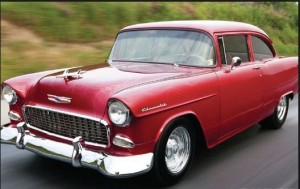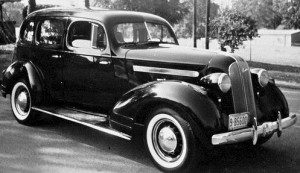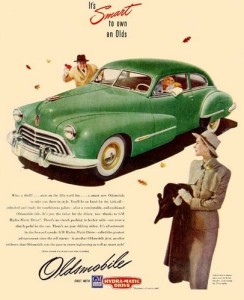We did without a car for a couple of years when I was a kid. I must have been 8 when my father sold the Pontiac, his first new car that he bought in 1935. By 1947, the 12-year-old machine was spending more time in Edgar Bartlett’s garage than it did conveying us from place to place, and it chewed up batteries at an upsetting rate. Besides, he told my mother, we needed the money to pay bills.
What’s more, our Elm Street landlord had asked us not to park the pre-war Pontiac in the graveled driveway of his house, lest it mar the elegant appearance of his property. “Well, Maude,” he had said, “I’m afraid that it looks junky.” My mother, who came from a cosmopolitan New York family, saw the landlord’s request as a ludicrous example of provincial snobbery. But as much as she laughed at his pretensions, she was glad to see the Pontiac go.
A car was not essential. My father could walk to the station for the train to Boston and my mother could easily reach Stacey’s Market at the corner of Orne and Washington for groceries. The Gerry school was a short walk for me. My grandparents spent the summer of 1948 in Europe and lent us their 1938 Ford which functioned reliably while they were gone.
When I was 10, my father found a used 1947 Oldsmobile coupé which featured a Hydra-Matic drive, an automatic transmission first introduced in 1937. The car was a faded blue, which looked dingy to my mother. She urged my father to have it waxed at Orel Hansen’s Gulf station with a special treatment called “Blue Coral,” but he said that we couldn’t afford it. She had accepted the gray, utilitarian and lumpy appearance of the ’35 Pontiac and of my grandfather’s ’38 Ford because all pre-war cars looked that way But the new Oldsmobile should look spiffy, she believed, especially in the light of humiliation that our Pontiac had suffered at the hands of our snooty landlord.
We had moved by the time we got the ’47 Olds and didn’t have to worry about the new landlord; he lived in Washington, DC. My mother had learned to drive on the Pontiac and was entirely comfortable with its gearshift and clutch. In fact when I was little I rode unrestrained in the front seat beside her. Many kids my age and older rode this way. As a special treat she let me operate the floor shift while she depressed the clutch. But the Hydra-Matic transmission in the Oldsmobile was something else. “It never shifts when it should,” she complained, and she was right. At certain moderate speeds it downshifted without warning, jolting us forward in our seats. My father had no trouble with the Hydra-Matic drive; he had learned on a Model T Ford with its complex transmission and could drive anything.
We kept this car for 6 years and after a few Marblehead winters it too became a frequent visitor to Bartlett’s garage, often requiring battery charging or replacement. My mother’s initial concern about its appearance was replaced by real worry about its reliability, particular in cold weather. The town required off-street parking in the winter so that snow plows could get through and we rented space in a dirt lot near the house. On some cold mornings, the car just wouldn’t start in spite of all the tricks my father knew, and he’d walk to the train station for his trip into Boston instead. But he always left enough juice in the battery so my mother would have a shot at starting it, in case the day warmed up.
One icy morning she and I walked to the lot and tried to start the car after we had brushed and shoveled a lot of snow. She turned the key, and a low rhythmic moaning issued from under the hood. Each time she turned the key the moaning resumed, but at a lower and lower pitch, as the battery exhausted its meager charge. I was 13 at the time and didn’t know enough about cold starting to give my mother useful advice, but I could tell when an engine was flooded just from the gasoline smell when we opened the hood. Then we had to wait for the gas to drain from the carburetor. “David. This time try jumping up and down on the bumper,” my mother commanded. It was a cold starting trick that seemed to work once in a while, although I never understood why it should. This time it didn’t.
How I settled on “The Heap” as a suitable pejorative for this vehicle I’m not sure. Modern terms like “junker,” “clunker,” and “beater,” weren’t in common use in the early 1950s, and “jalopy,” seemed too common. It’s easy to image that “Heap,” evolved as a contraction from a graphic expression of disgust. “This car is just heap of …” Well, you know what I mean.

Restored basic 1955 Model 150 Chevy. Hood ornament and fat tires added by the restorer. Ours lacked both and it was blue. Note the chrome-less windshield seal.
I don’t know how my father managed to find the money for a down payment on a 1955 Chevrolet, his second new car, after the ’35 Pontiac, that he was able to buy new. The Heap, I’m sure, made a quick trip to the junkyard. The Chevy was a modern wonder with its stylish windshield, bent back at the sides, clean blue color and spacious windows. It had a blessed manual transmission, with gearshift and clutch; no more unpredictable downshifting. A year later, when I was 17, I learned to drive in this car. My father maintained it carefully and it lasted well into my college years.
Maybe a year before the miracle of the ’55 Chevy, while we were still contending with the Heap, my father noticed a familiar car driving past us in the opposite direction on Elm Street. It was our 1935 Pontiac; its new owner had managed to coax another five years out if it, long after we had given it up for dead.



Love reading your articles
Thanks so much! Take care. Great picture of you, Rens and grandkids on FB!
“…waxed at Orel Hansen’s Gulf station…”
For many years, and for Paul most of his life, we’ve had our cars maintained/repaired by Orel’s son, Harold Hansen in his automotive shop down on Sewall Street next to the old bowling alleys. Just this year, Harold finally retired from that occupation! We found a replacement car doctor – where else? At Bartlett’s Garage down near the Old North Church!
That’s the thing about Marblehead… things go on forever there… “Oh Marblehead Forever, God Bless that Dear Old Town”
Thanks so much Rebecca. I have enough enough material to do short piece on Bartlett’s, but it will be a while.